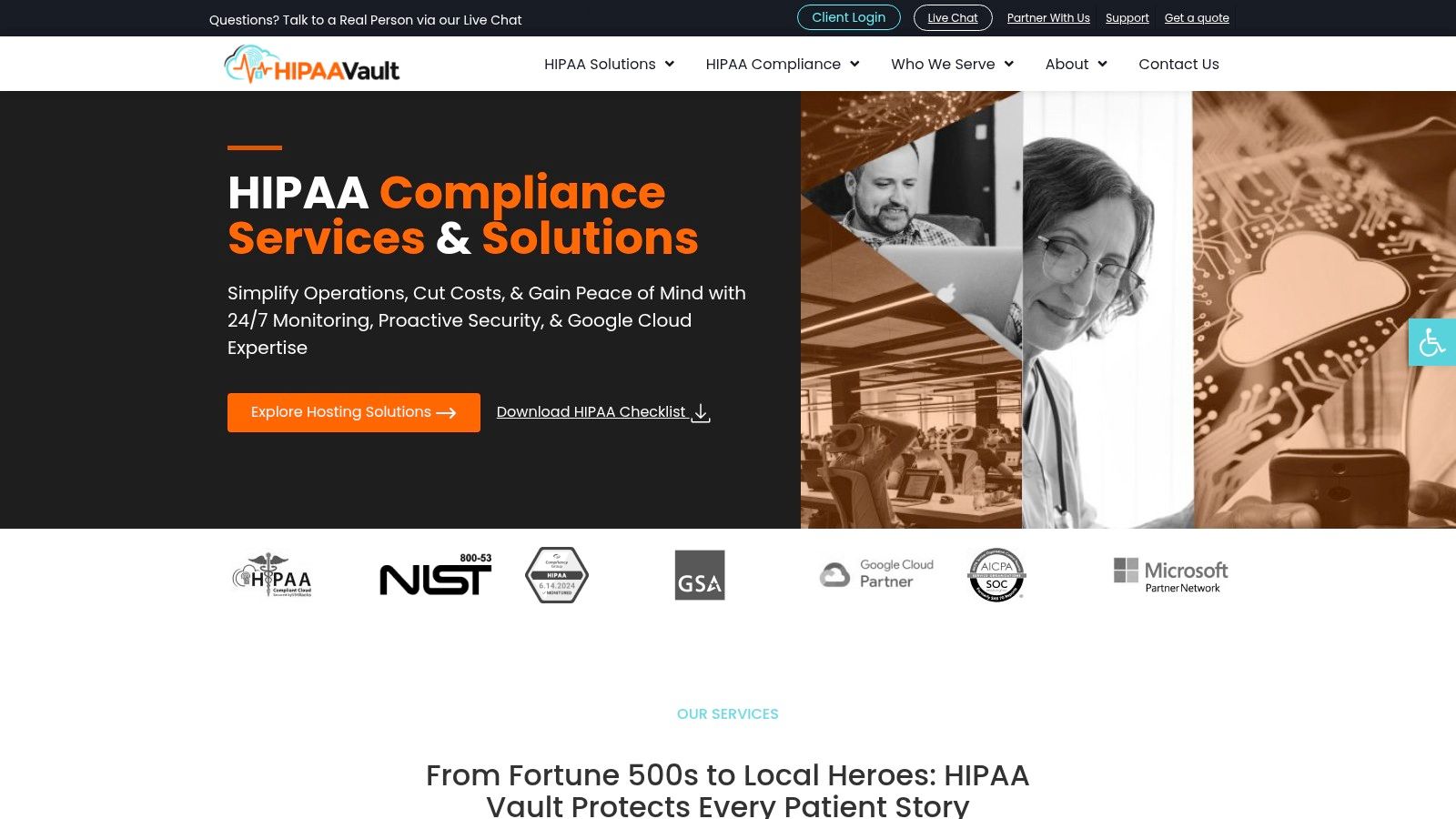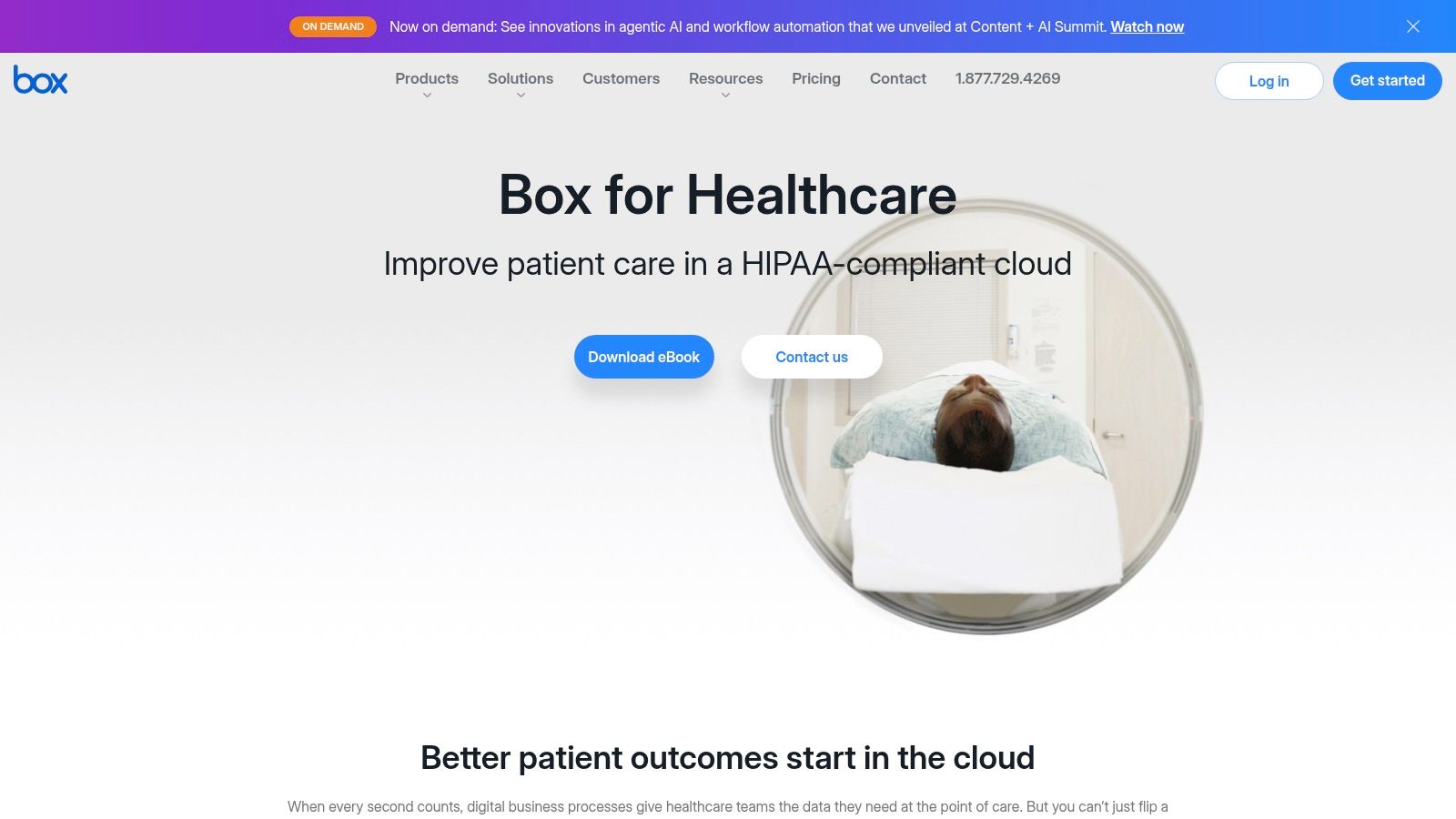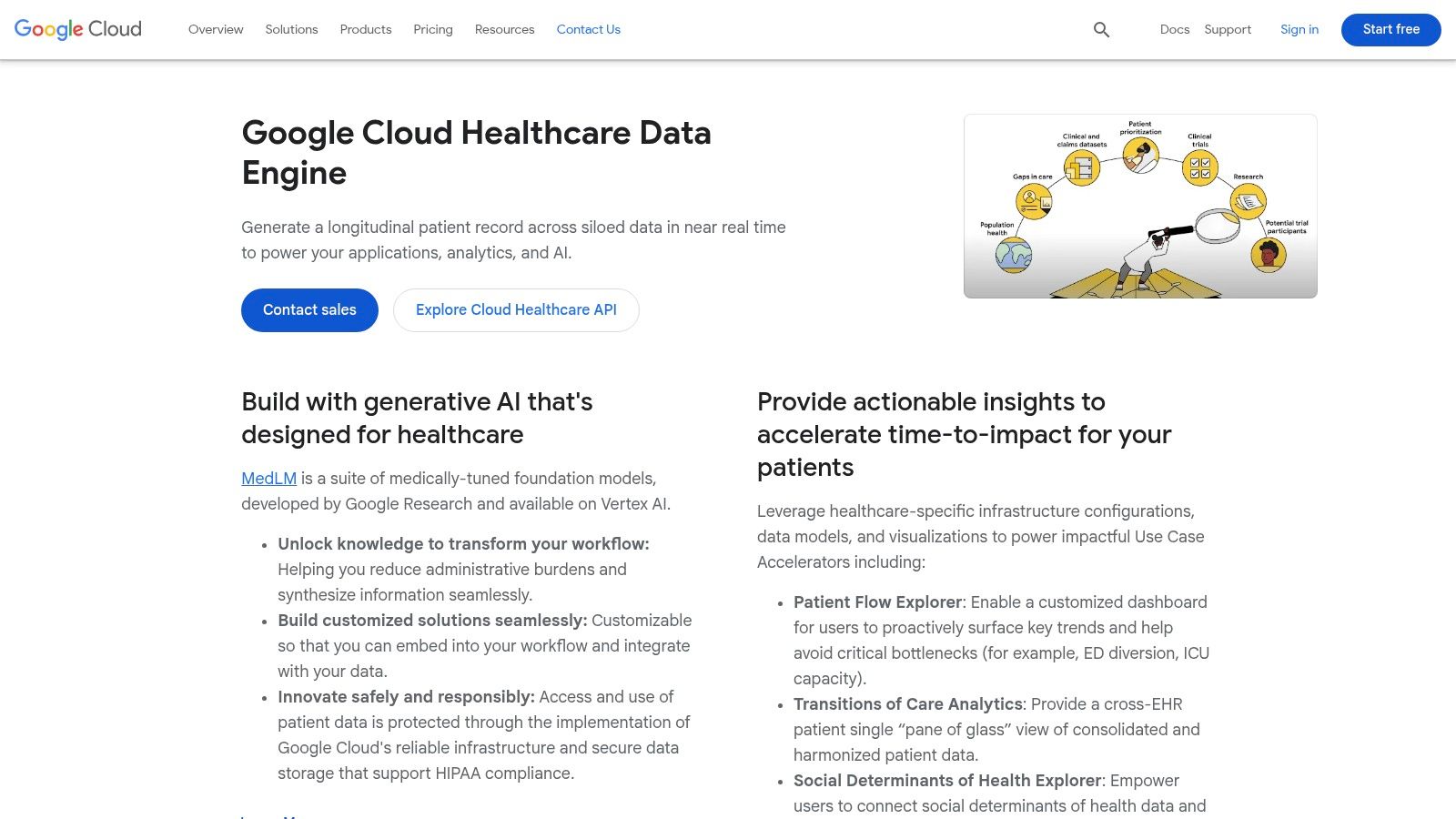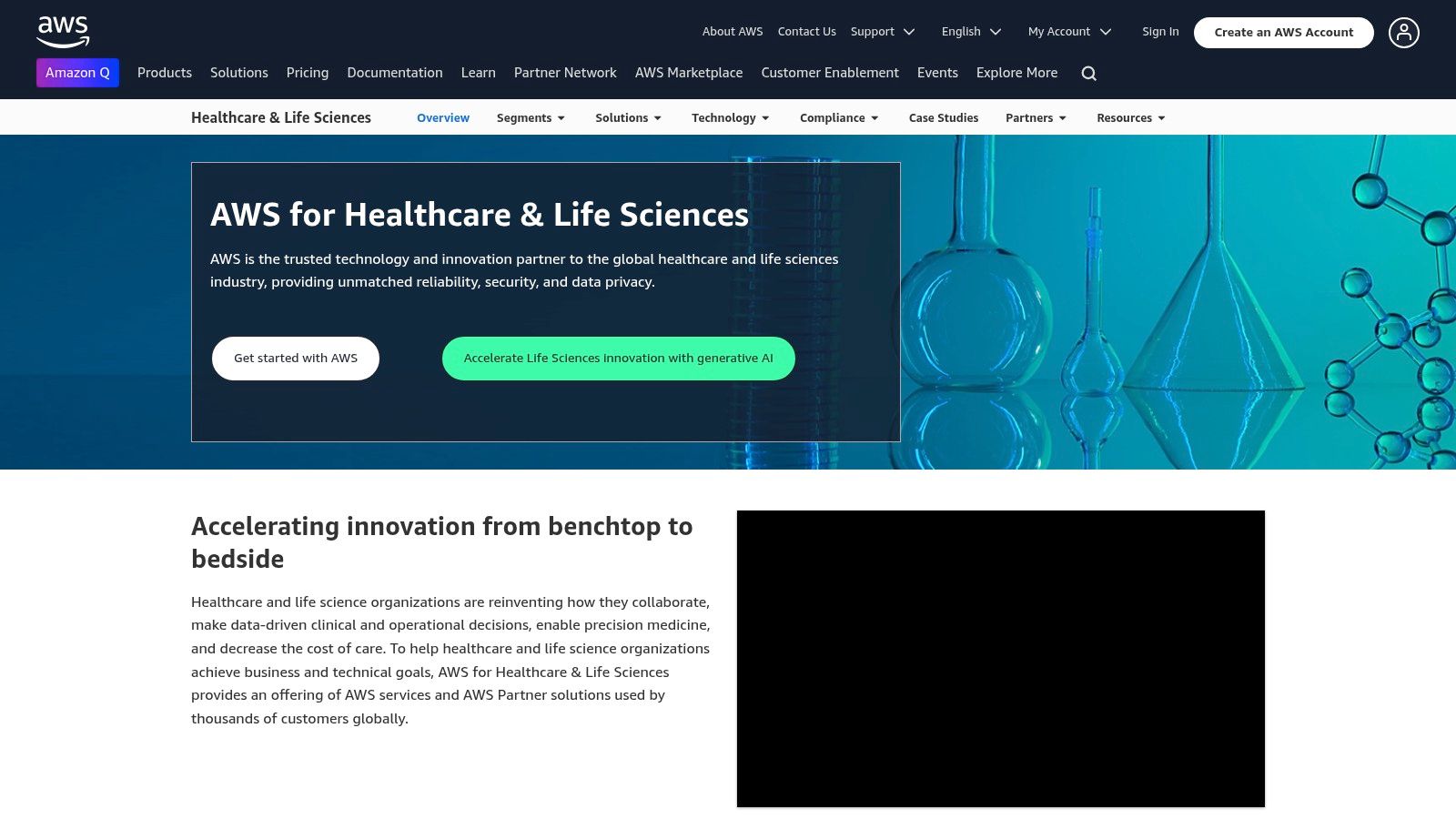Top 7 HIPAA Compliant Cloud Storage Solutions in 2025
Protecting Patient Data in the Cloud
Storing protected health information (PHI) securely is critical for healthcare organizations. This listicle presents seven leading HIPAA compliant cloud storage solutions for 2025, helping legal professionals, providers, and compliance officers choose the right platform. These tools address the challenge of maintaining patient data confidentiality and integrity while leveraging the benefits of cloud technology. Quickly compare options like HIPAA Vault, Box for Healthcare, Google Cloud and Azure Healthcare APIs, Dropbox Business, AWS Healthcare, and Carbonite, examining their features, benefits, and drawbacks to find the ideal HIPAA compliant cloud storage for your needs.
1. HIPAA Vault
HIPAA Vault is a leading HIPAA compliant cloud storage solution specifically designed for healthcare organizations and their business associates. If you're handling Protected Health Information (PHI), robust security and guaranteed compliance are non-negotiable. HIPAA Vault addresses these critical needs by offering a comprehensive platform built from the ground up to meet all HIPAA security and privacy requirements. This includes medical practitioners, healthcare facilities, and any business associates dealing with sensitive patient data. They also offer 24/7 support and a dedicated compliance team ready to assist with any regulatory questions, making it a valuable partner in navigating the complex landscape of HIPAA compliance.

HIPAA Vault's robust feature set is designed to safeguard PHI and streamline compliance efforts. Key features include 256-bit AES encryption at rest and in transit, ensuring data is protected both during storage and transmission. A Business Associate Agreement (BAA) is included in all plans, solidifying the shared responsibility for HIPAA compliance. Comprehensive audit logs and reporting allow for detailed tracking of data access and modifications, essential for demonstrating compliance during audits. Further enhancing security, HIPAA Vault provides customizable access controls and user permissions, allowing administrators to finely control who can access specific information. Automated backups with versioning add another layer of protection against data loss and ensure data recovery in case of accidental deletion or system failures. For a deeper understanding of data security and compliance, learn more about HIPAA Vault and the importance of protecting sensitive information.
Practical Applications and Use Cases:
- Securely storing patient medical records: HIPAA Vault provides a secure repository for storing all types of patient data, including medical histories, lab results, and imaging files.
- Sharing PHI between healthcare providers: The platform facilitates secure and compliant sharing of PHI between authorized individuals and organizations.
- Managing backups and disaster recovery: HIPAA Vault’s automated backup and recovery features ensure business continuity in the event of a data loss incident.
- Meeting HIPAA audit requirements: The comprehensive audit trails and reporting features simplify the process of demonstrating HIPAA compliance during audits.
Pros:
- Purpose-built for healthcare and HIPAA compliance.
- Dedicated compliance team available for support.
- User-friendly interface designed for medical professionals.
- Scalable solution suitable for both small practices and large healthcare systems.
Cons:
- Higher cost compared to general cloud storage providers not specifically designed for HIPAA compliance.
- Mobile applications could benefit from further development.
- Limited integration with some Electronic Health Record (EHR) systems.
Pricing and Technical Requirements:
While specific pricing isn't publicly listed, potential users are encouraged to contact HIPAA Vault directly for tailored quotes. Technical requirements are generally minimal, as the platform is accessed via web browser or dedicated applications.
HIPAA Vault deserves its place on this list because it prioritizes HIPAA compliance above all else. For organizations dealing with the sensitive nature of PHI, investing in a purpose-built solution like HIPAA Vault provides the peace of mind that comes with knowing patient data is handled with the utmost security and in accordance with all regulatory requirements. You can visit their website at https://www.hipaavault.com/ for more information.
2. Box for Healthcare
Box for Healthcare is a robust, enterprise-grade cloud content management platform specifically designed to offer HIPAA compliant cloud storage solutions for the healthcare industry. This platform goes beyond simple storage, providing a secure environment for collaboration between healthcare providers, researchers, and even patients, all while adhering to stringent healthcare regulations. This makes it a strong contender for organizations needing top-tier security and collaboration features. For legal professionals involved in healthcare cases, Box provides a secure repository for sensitive documents, simplifying discovery and ensuring confidentiality. Security and compliance officers can rely on its robust audit trails and reporting capabilities for streamlined compliance management.

One of Box's key strengths is its commitment to security. It implements technical, physical, and administrative safeguards to protect sensitive health information (PHI) and willingly signs Business Associate Agreements (BAAs), essential for HIPAA compliance. Features like end-to-end encryption and granular permissions ensure only authorized individuals access specific data. Detailed audit trails and reporting capabilities provide transparency and facilitate compliance audits. Furthermore, automated security classifications for sensitive content streamline workflows and minimize the risk of human error. Box for Healthcare also boasts seamless integration with existing healthcare systems, including popular EMR/EHR systems like Epic, further simplifying workflows and data management for healthcare providers. It holds key certifications, including HIPAA, HITRUST, FedRAMP, and SOC compliance, demonstrating its dedication to maintaining rigorous security standards.
For healthcare providers, Box facilitates secure sharing of patient records, lab results, and medical images, enhancing care coordination. Researchers can use the platform for collaborative data analysis while maintaining patient privacy. The platform's flexible access control options allow administrators to tailor permissions based on roles and responsibilities. Comprehensive mobile support ensures that authorized personnel can access information securely from any location, further enhancing care coordination and responsiveness.
While Box offers robust security and collaboration features, it's essential to consider the potential drawbacks. The enterprise-grade pricing can be a significant investment, particularly for smaller practices. The administration interface, while powerful, can be complex and may require dedicated IT expertise for optimal configuration and management. Some advanced features, such as unlimited storage or advanced security classifications, are often limited to higher-tier plans, requiring careful consideration of your organization's specific needs and budget.
Pros:
- Strong enterprise-level security and governance
- Excellent collaboration tools for healthcare teams
- Flexible access control options
- Comprehensive mobile support
Cons:
- Enterprise pricing can be expensive for smaller practices
- Complex administration interface may require IT expertise
- Some advanced features limited to higher-tier plans
Website: https://www.box.com/industries/healthcare
Box for Healthcare deserves its place on this list because it offers a comprehensive and secure solution for HIPAA compliant cloud storage. It prioritizes security and compliance while providing the necessary tools for seamless collaboration and integration within the healthcare ecosystem. However, organizations should carefully evaluate their budget and technical capabilities before implementing Box, as its complexity and cost may be prohibitive for some.
3. Google Cloud for Healthcare
Google Cloud for Healthcare offers a robust suite of tools designed to ensure HIPAA compliant cloud storage and facilitate advanced data analysis. This platform goes beyond simple storage, providing specialized solutions for managing, processing, and deriving insights from protected health information (PHI). This makes it a strong contender for healthcare organizations seeking secure and scalable cloud solutions. It leverages Google Cloud Storage as its foundation, offering a secure and durable environment for storing sensitive patient data. Google's commitment to HIPAA compliance is solidified through their Business Associate Agreement (BAA), giving covered entities and business associates the assurance they need to trust Google with their PHI.

For legal professionals dealing with healthcare data, Google Cloud for Healthcare provides a secure repository for eDiscovery and other legal processes involving PHI. Healthcare providers benefit from streamlined data management, facilitating better patient care through efficient access to medical records. Similarly, security and compliance officers can leverage the platform's built-in security features and compliance certifications to simplify audits and ensure adherence to HIPAA regulations. Learn more about Google Cloud for Healthcare as it pertains to data security.
A key advantage of Google Cloud for Healthcare lies in its specialized healthcare APIs and tools. The Healthcare API supports industry-standard formats like FHIR, HL7v2, and DICOM, enabling seamless interoperability between different healthcare systems. This facilitates efficient data exchange and collaboration amongst healthcare providers. Furthermore, the Cloud Healthcare Data Engine offers a unified platform for managing and analyzing diverse health data, simplifying complex data integration challenges.
Beyond storage and interoperability, Google Cloud for Healthcare offers powerful data analytics and AI capabilities. Researchers and clinicians can leverage these tools to gain insights from large datasets, accelerating medical research and improving patient outcomes. Features such as de-identification and anonymization further enhance privacy while allowing for valuable data analysis.
While the platform boasts numerous advantages, it's essential to be aware of potential drawbacks. The pricing structure can be complex, requiring careful consideration of storage needs and usage patterns. Furthermore, the platform's advanced features may present a steeper learning curve for non-technical users, potentially necessitating technical expertise for optimal configuration and implementation.
Features:
- Healthcare API for FHIR, HL7v2, and DICOM data
- Advanced security with encryption by default
- Cloud Healthcare Data Engine for unified health data
- AI and machine learning capabilities for healthcare insights
- Comprehensive compliance certifications (HIPAA, HITRUST, ISO)
Pros:
- Powerful data analytics and AI capabilities
- Excellent scalability for large datasets
- Strong integration with other Google Cloud services
- Global infrastructure with high availability
Cons:
- Pricing structure can be complex
- Steeper learning curve for non-technical users
- May require technical expertise for optimal configuration
Website: https://cloud.google.com/healthcare
4. Microsoft Azure Healthcare APIs
Microsoft Azure Healthcare APIs offers a robust suite of tools and services designed specifically for HIPAA compliant cloud storage and management of sensitive healthcare data. This platform goes beyond basic storage by providing specialized APIs that streamline interoperability and facilitate advanced analytics, making it a compelling option for organizations dealing with Protected Health Information (PHI). For legal professionals advising healthcare clients, security and compliance officers, and healthcare providers themselves, understanding the capabilities of Azure Healthcare APIs is crucial in today's data-driven healthcare landscape.

A key strength of Azure Healthcare APIs lies in its support for industry-standard data formats. The Azure API for FHIR (Fast Healthcare Interoperability Resources) empowers developers to build and deploy interoperable healthcare solutions that seamlessly exchange data. This is critical for sharing information between different healthcare systems and facilitating collaborative care. The platform's DICOM (Digital Imaging and Communications in Medicine) service provides a secure and scalable solution for managing and analyzing medical imaging data, crucial for radiology departments and research institutions. Furthermore, integration with Microsoft 365 healthcare solutions enhances productivity and collaboration while maintaining HIPAA compliance.
From a practical standpoint, imagine a hospital system wanting to implement a telehealth platform. Azure Healthcare APIs can securely store patient data, including medical images and clinical records, while the FHIR API enables interoperability with other healthcare systems, allowing for seamless data exchange during virtual consultations and remote monitoring. Another example would be a research institution analyzing large datasets of anonymized patient data to identify trends and develop new treatments. The platform’s advanced analytics capabilities, coupled with its compliance certifications, provide a secure and efficient environment for such research activities.
While Microsoft offers a Business Associate Agreement (BAA) providing contractual assurances of HIPAA compliance, understanding the shared responsibility model is essential. Microsoft manages the underlying infrastructure security, while the client is responsible for configuring and managing access controls, data encryption, and application-level security. Learn more about Microsoft Azure Healthcare APIs and other cloud security compliance standards to gain a deeper understanding of these responsibilities.
One of the downsides to consider is the complex pricing structure of Azure. Accurately estimating costs can be challenging due to the various services and consumption-based pricing. Optimal configuration and management often require specific Azure expertise, which may necessitate additional training or hiring specialized staff. Furthermore, some healthcare-specific features are still in preview or development, so keeping up with the latest updates and roadmaps is crucial.
Key Features and Benefits:
- FHIR and DICOM Support: Seamlessly work with industry-standard healthcare data formats.
- Microsoft 365 Integration: Enhanced collaboration within a secure and compliant environment.
- Robust Security and Compliance: Advanced threat protection, monitoring, and adherence to HIPAA, HITRUST, and SOC standards.
- Global Data Center Presence: Geo-redundancy options ensure data availability and disaster recovery.
Pros:
- Strong integration with existing Microsoft environments.
- Robust identity and access management through Azure AD.
- Comprehensive compliance portfolio.
Cons:
- Complex pricing model.
- May require Azure expertise for optimal configuration.
- Some healthcare features still in preview/development.
Website: https://azure.microsoft.com/en-us/industries/healthcare/
Microsoft Azure Healthcare APIs deserve a place on this list because they offer a comprehensive and specialized platform for HIPAA compliant cloud storage and healthcare data management, going beyond simple storage to provide tools for interoperability, analytics, and secure collaboration within the healthcare ecosystem. However, potential users should carefully evaluate the pricing model and technical requirements before implementation.
5. Dropbox Business with BAA
Dropbox Business, when paired with a signed Business Associate Agreement (BAA), provides a HIPAA compliant cloud storage solution suitable for healthcare organizations of varying sizes. This makes it a strong contender for those seeking secure storage and sharing of Protected Health Information (PHI). Its key strength lies in balancing robust security with an intuitive interface, making it a practical choice for teams already familiar with the consumer version of Dropbox.
Dropbox Business earns its place on this list due to its widely recognized user-friendliness, cross-platform compatibility, and integration with other common healthcare applications. This ease of use minimizes the training burden for staff, facilitating quicker adoption and integration into existing workflows. For healthcare providers, legal professionals, and security and compliance officers, this means streamlined processes and reduced administrative overhead.
Key Features for HIPAA Compliance:
- Robust Encryption: Dropbox utilizes 256-bit AES encryption at rest and SSL/TLS encryption in transit, ensuring data protection both within their servers and during transmission.
- Granular Access Controls: Administrators can implement granular sharing permissions, restricting access to PHI based on roles and responsibilities within the organization. This is crucial for maintaining compliance with HIPAA's access control requirements.
- Comprehensive Audit Trails: Detailed audit logs track user activity, including file access, modifications, and sharing, providing a crucial audit trail for compliance reporting and investigations. This allows compliance officers to readily monitor data handling practices and identify potential security breaches.
- Remote Wipe Functionality: The ability to remotely wipe data from lost or stolen devices is a vital security feature, mitigating the risk of PHI falling into the wrong hands.
- Compliance Certifications: Dropbox Business adheres to HIPAA, HITECH, and SOC 2 compliance standards when used with a BAA, offering assurance to healthcare organizations that their data is being handled securely.
Pros:
- Intuitive User Interface: The familiar Dropbox interface requires minimal training, leading to faster adoption and increased user satisfaction.
- Cross-Platform Compatibility: Access and manage files seamlessly across various devices (desktops, laptops, mobile devices), promoting collaboration and flexibility within healthcare teams.
- Integrations: Integrates well with numerous healthcare applications, potentially streamlining workflows and enhancing data management efficiency.
- Smart Sync: This feature allows users to access all their files from their desktop while saving valuable local storage space, which is particularly beneficial for those working with large medical image files.
Cons:
- Limited Healthcare-Specific Features: Compared to more specialized HIPAA compliant cloud storage solutions, Dropbox Business may offer fewer features tailored specifically for the healthcare industry.
- Tiered Admin Controls: Advanced administrative controls, essential for granular management and compliance oversight, might only be available on higher-tier, more expensive subscription plans.
- Customer Support Concerns: Some users have reported inconsistent experiences with customer support, which can be a concern when dealing with sensitive PHI and potential compliance issues.
Pricing and Technical Requirements:
Pricing for Dropbox Business varies depending on the number of users and storage space required. Contact Dropbox sales for specific pricing information. Technical requirements are minimal, requiring only an internet connection and compatibility with common operating systems and web browsers.
Implementation and Setup Tips:
- Ensure a BAA is signed with Dropbox before storing any PHI.
- Implement strong password policies and enable two-factor authentication for all users.
- Configure granular access controls based on roles and responsibilities.
- Regularly review audit logs to monitor user activity and identify potential security risks.
- Train staff on HIPAA compliance and best practices for using Dropbox Business to store and share PHI securely.
Comparison with Similar Tools: While other cloud storage solutions offer HIPAA compliant options, Dropbox Business distinguishes itself through its user-friendly interface and widespread familiarity. This can be a significant advantage for healthcare organizations prioritizing ease of adoption and integration.
Learn more about Dropbox Business with BAA for further insights. You might also find value in exploring HIPAA-compliant transcription services to ensure the secure handling of patient data. Choosing a HIPAA compliant cloud storage solution is crucial for any healthcare provider or legal professional working with PHI. Dropbox Business with BAA provides a robust yet user-friendly option to ensure data security and regulatory compliance. Visit their website for more details: https://www.dropbox.com/business/solutions/healthcare
6. AWS Healthcare
For organizations seeking robust and scalable HIPAA compliant cloud storage, Amazon Web Services (AWS) Healthcare offers a compelling suite of services. AWS provides HIPAA-compliant cloud storage primarily through its widely used object storage service, Amazon S3, and complements it with purpose-built healthcare solutions. This allows covered entities to leverage the power and flexibility of the AWS cloud while adhering to strict regulatory requirements for protecting Protected Health Information (PHI). AWS signs Business Associate Agreements (BAAs) with covered entities, taking on the shared responsibility for HIPAA compliance and providing an extra layer of assurance.

AWS Healthcare goes beyond basic storage, offering tools for processing and analyzing healthcare data. Services like AWS HealthLake allow for the storage and analysis of data in the Fast Healthcare Interoperability Resources (FHIR) format, a standard for exchanging healthcare information electronically. This makes it easier for healthcare providers and researchers to access and utilize data effectively. Furthermore, AWS offers powerful analytics and machine learning capabilities that can be applied to healthcare data, unlocking valuable insights for improving patient care and operational efficiency. For instance, hospitals could utilize AWS to analyze patient data to predict readmission rates, while pharmaceutical companies could leverage machine learning services for drug discovery.
Security is paramount when dealing with PHI, and AWS provides a comprehensive set of security features. End-to-end encryption with AWS Key Management Service (AWS KMS) integration ensures data is protected both in transit and at rest. Granular access controls and robust identity management capabilities allow organizations to restrict access to sensitive data based on roles and responsibilities. Detailed auditing and monitoring through CloudTrail provide visibility into user activity and help identify potential security breaches. These features, coupled with extensive compliance certifications including HIPAA, HITRUST, and FedRAMP, solidify AWS's position as a trusted platform for healthcare data.
Pros:
- Scalability and Cost-Effectiveness: AWS offers unmatched scalability with a pay-as-you-go pricing model, allowing organizations to scale their storage and computing resources as needed.
- Comprehensive Security: Robust security features and controls, including encryption, access controls, and auditing, ensure the protection of PHI.
- Healthcare Ecosystem: A vast partner ecosystem provides access to a wide range of healthcare-specific solutions and expertise.
- Advanced Analytics: Powerful analytics and machine learning capabilities enable organizations to derive valuable insights from healthcare data.
Cons:
- Complexity: The breadth and depth of AWS services can be overwhelming, requiring technical expertise to navigate and configure effectively.
- Management Overhead: Maintaining compliance requires ongoing effort and management of various security configurations.
- Potential for Unexpected Costs: Without careful monitoring and cost optimization strategies, AWS usage can lead to unexpected expenses.
Implementation Tips:
- Start with a clear understanding of your specific needs and regulatory requirements.
- Work with an AWS partner or consultant if you lack in-house expertise.
- Implement robust access controls and monitoring from the outset.
- Utilize cost management tools to track and optimize your spending.
For legal professionals, healthcare providers, and security/compliance officers, AWS offers a powerful yet complex solution for HIPAA compliant cloud storage. While the learning curve and management overhead can be significant, the scalability, security features, and advanced analytics capabilities make AWS Healthcare a valuable tool for organizations looking to leverage the cloud for their healthcare data needs. You can explore AWS Healthcare services further at https://aws.amazon.com/health/.
7. Carbonite HIPAA Compliant Backup
For smaller healthcare practices seeking a straightforward and reliable solution for HIPAA compliant cloud storage, Carbonite HIPAA Compliant Backup offers a compelling option. This service focuses on ensuring your patient data is securely stored, readily recoverable, and adheres to all HIPAA regulations. Its strength lies in its simplicity and affordability, making it an excellent choice for organizations with limited IT resources.
Carbonite understands the criticality of data protection in healthcare and offers a dedicated HIPAA-compliant plan complete with a signed Business Associate Agreement (BAA). This is essential for demonstrating compliance and protecting your practice from potential penalties. They employ robust security measures, including AES 256-bit encryption for data both at rest and in transit, ensuring your patient health information (PHI) remains confidential.
Key Features and Benefits:
- Automated and Continuous Backup: Carbonite automatically and continuously backs up your critical data, minimizing the risk of data loss due to human error or unforeseen events.
- Point-in-Time Recovery: This feature allows you to restore data to a specific point in time, which is crucial for recovering from ransomware attacks or accidental data deletions.
- Detailed Audit Trails and Reporting: Maintain comprehensive records of data access and modifications, simplifying compliance audits and investigations.
- Dedicated Customer Support for Healthcare Clients: Carbonite provides specialized support tailored to the unique needs of healthcare organizations, ensuring you receive prompt and knowledgeable assistance.
Practical Applications and Use Cases:
Carbonite's HIPAA compliant cloud storage solution is particularly well-suited for:
- Small medical practices: Its ease of setup and management makes it ideal for clinics and practices with limited IT staff.
- Dental offices: Protecting patient records, X-rays, and other sensitive data.
- Specialty clinics: Securing specialized medical data while adhering to HIPAA regulations.
Pros:
- Easy setup and management with minimal IT requirements.
- Reliable disaster recovery capabilities.
- Good value for smaller healthcare organizations.
- Dedicated customer support for healthcare clients.
Cons:
- More focused on backup than collaboration features. If your organization requires robust file sharing and collaboration tools, you might need to explore other options.
- Limited advanced healthcare-specific features. While Carbonite covers the core requirements for HIPAA compliance, it may not offer the specialized features found in some other solutions.
- Some users report slower restore speeds for large datasets. This is a consideration if your organization deals with particularly large volumes of data. Learn more about Carbonite HIPAA Compliant Backup This article discusses data backup strategies in more detail and can provide valuable insights into choosing the right solution for your needs.
Pricing and Technical Requirements:
While specific pricing information isn't readily available and requires contacting Carbonite directly, their solutions are generally positioned as cost-effective for smaller organizations. Technical requirements are minimal, aligning with their focus on easy setup and management.
Comparison with Similar Tools:
Compared to other HIPAA compliant cloud storage solutions, Carbonite prioritizes simplicity and affordability. While solutions like Veeam or Azure offer more advanced features and scalability, they often come with higher price tags and increased complexity. Carbonite occupies a valuable niche for those seeking a straightforward, reliable, and cost-effective backup solution.
Implementation/Setup Tips:
- Inventory your data: Before implementation, thoroughly inventory all PHI and other critical data that needs to be backed up.
- Develop a recovery plan: Outline the steps to be taken in case of data loss or disaster.
- Test your backups regularly: Ensure your backups are functioning correctly and that data can be restored effectively.
Website: https://www.carbonite.com/data-protection/use-cases/hipaa-compliant-backup
Carbonite HIPAA Compliant Backup deserves its place on this list because it provides a reliable and affordable entry point for smaller healthcare organizations seeking to comply with HIPAA regulations. Its focus on simplified backup and recovery makes it an excellent choice for practices that prioritize ease of use and cost-effectiveness. By prioritizing security and compliance, Carbonite empowers healthcare providers to focus on patient care without worrying about the complexities of data protection.
HIPAA Compliant Cloud Storage Comparison
| Platform | Core Features & Security ✨ | User Experience & Support ★★★★☆ | Value & Pricing 💰 | Target Audience 👥 | Unique Selling Points 🏆 |
|---|---|---|---|---|---|
| HIPAA Vault | 256-bit AES encryption, BAA, audit logs, access control | User-friendly, 24/7 support | Higher cost, tailored for healthcare | Healthcare orgs, medical practitioners | Purpose-built HIPAA solution, compliance team ✨ |
| Box for Healthcare | End-to-end encryption, audit trails, EMR/EHR integration | Strong collaboration tools, mobile-ready | Enterprise pricing, scalable | Large healthcare systems, research teams | Enterprise-grade security, multi-certifications 🏆 |
| Google Cloud for Healthcare | Healthcare APIs (FHIR, DICOM), AI capabilities, encryption | Scalable, powerful analytics | Complex pricing | Tech-savvy healthcare providers | AI-driven insights, global infrastructure ✨ |
| Microsoft Azure Healthcare APIs | FHIR/DICOM APIs, threat protection, Azure AD integration | Strong Microsoft ecosystem integration | Complex pricing | Microsoft users, healthcare IT experts | Deep Microsoft 365 integration, identity mgmt 🏆 |
| Dropbox Business with BAA | AES encryption, granular permissions, audit logging | Intuitive UI, cross-platform | Competitive, limited advanced admin | Healthcare teams needing easy adoption | Familiar UI, Smart Sync saves local storage ✨ |
| AWS Healthcare | AWS HealthLake, encryption, identity mgmt, CloudTrail | Scalable, extensive service portfolio | Pay-as-you-go, potential hidden fees | Large healthcare orgs, developers | Broad partner ecosystem, ML/analytics 🏆 |
| Carbonite HIPAA Backup | AES encryption, continuous backup, point-in-time recovery | Easy setup, dedicated support | Good value for small practices | Small healthcare practices | Simple HIPAA backup with disaster recovery 🏆 |
Choosing the Right HIPAA Compliant Cloud Storage
Selecting the right HIPAA compliant cloud storage solution is paramount for safeguarding protected health information (PHI). From HIPAA Vault's robust security measures to the flexible integration options of Microsoft Azure Healthcare APIs and the user-friendly interface of Dropbox Business with BAA, each tool discussed in this article offers unique advantages. Furthermore, specialized solutions like Box for Healthcare, Google Cloud for Healthcare, AWS Healthcare, and Carbonite HIPAA Compliant Backup cater to specific healthcare industry needs, ranging from enhanced data analytics to streamlined backup and disaster recovery.
Key takeaways when choosing your HIPAA compliant cloud storage include focusing on strong encryption, reliable audit trails, and robust access controls. Scalability is crucial for growing organizations, while seamless integration with your existing systems can significantly improve workflow efficiency. Cost is another important factor; evaluate the pricing models of different providers and choose a solution that fits your budget without compromising on security. When choosing a HIPAA compliant cloud storage solution, it's essential to consider data location and jurisdictional regulations. For businesses operating in Germany, exploring options specifically designed for the German market can simplify compliance. Learn more about these considerations in this helpful resource: Cloud Speicher Deutschland (Source: 29 03 2025 Cloud Speicher Deutschland from Deeken.Technology GmbH).
Ultimately, the best HIPAA compliant cloud storage solution is the one that aligns perfectly with your organization's unique requirements, budget, and long-term goals. By diligently evaluating these factors, you can ensure the confidentiality, integrity, and availability of your patients’ sensitive data.
Streamline your document workflow while maintaining HIPAA compliance. Explore Whisperit, an AI-powered platform that can help create, manage, and secure your documents within your chosen HIPAA compliant cloud storage environment.